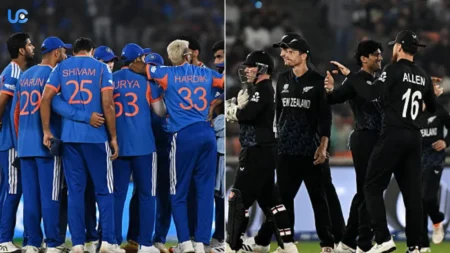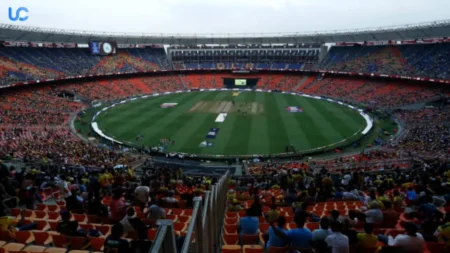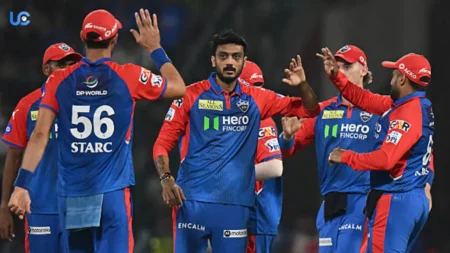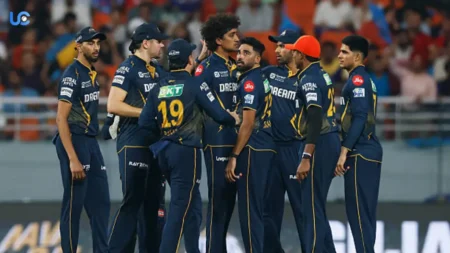A Boxing Day Test match is quite a significant affair in international cricket. It is this one match that millions of cricket fans across the world look forward to.
But what exactly is a Boxing Day Test match? What is the history? And how does India fare?
In this article, we’ll look at the history of Boxing Day Tests and India’s record.
Read Also: India vs Australia Pink Ball Test Match Records
What is a Boxing Day Test Match?
A Boxing Day Test match is the one that starts the day after Christmas every year. That means a Test match that has its first scheduled day on December 26. Currently, these Tests take place mostly in Southen hemisphere countries like Australia, New Zealand, and South Africa.
The Test match derives its name from a tradition of opening gift boxes in churches after Christmas day.
Read Also: IND vs AUS Test Series Head-to-Head
What is the history of Boxing Day Test matches?
The first instance of the Boxing Day coinciding with a cricket match was back in 1892. The Sheffield Shield match played between Victoria and New South Wales in Australia had one of its playing days scheduled on Boxing Day.
But it wasn’t until 1913 that the first-ever Boxing Day Test match took place. South Africa hosted England for a five-match series in 1913-14, with the second match starting the day after Christmas.
See Also:- Australia Test Record in Boxing Day Matches
However, Boxing Day Tests weren’t a regular affair until 1950. Australia and South Africa started hosting touring teams for Boxing Day Tests, with other countries following in.
These matches played at the Melbourne Cricket Ground (MCG) have become a part of the cricketing tradition which started in 1980. Back then, the Melbourne Cricket Club and the Australian Cricket Board collaborated to host Boxing Day Test matches every year at the MCG.
Since then, the significance of Boxing Day Tests played across the world has risen manifold.
You Can Read Also:- Border-Gavaskar Trophy Winners List All Time
What is India’s record in Boxing Day Test matches?
India featured in their first-ever Boxing Day Test back in 1967, which they lost by 146 runs in Adelaide. In the next few years, India also hosted four such Tests which ended in draws.
Overall, India’s record isn’t noteworthy in Boxing Day Tests. The Men in Blue thus far have played in 22 Boxing Day Tests, winning only four of them.
India’s first win came in 2010, as they defeated South Africa by 87 runs in Durban. However, India have won three of their last four Boxing Day Tests, with two victories coming at the MCG.
Here’s India’s record in Boxing Day Test matches:
| No. | Year | Opposition | Venue | Result |
|---|---|---|---|---|
| 1 | 1967 | Australia | Adelaide | Lost by 146 runs |
| 2 | 1979 | Pakistan | Kanpur | Draw |
| 3 | 1981 | England | Delhi | Draw |
| 4 | 1983 | West Indies | Chennai | Draw |
| 5 | 1987 | West Indies | Kolkata | Draw |
| 6 | 1985 | Australia | Melbourne | Draw |
| 7 | 1991 | Australia | Melbourne | Lost by 8 wickets |
| 8 | 1992 | South Africa | Gqeberha | Lost by 9 wickets |
| 9 | 1996 | South Africa | Durban | Lost by 328 runs |
| 10 | 1998 | New Zealand | Wellington | Lost by 4 wickets |
| 11 | 1999 | Australia | Melbourne | Lost by 180 runs |
| 12 | 2003 | Australia | Melbourne | Lost by 9 wickets |
| 13 | 2006 | South Africa | Durban | Lost by 174 runs |
| 14 | 2007 | Australia | Melbourne | Lost by 337 runs |
| 15 | 2010 | South Africa | Durban | Won by 87 runs |
| 16 | 2011 | Australia | Melbourne | Lost by 122 runs |
| 17 | 2013 | South Africa | Durban | Lost by 10 wickets |
| 18 | 2014 | Australia | Melbourne | Draw |
| 19 | 2018 | Australia | Melbourne | Won by 137 runs |
| 20 | 2020 | Australia | Melbourne | Won by 8 wickets |
| 21 | 2021 | South Africa | Centurion | Won by 113 runs |
| 22 | 2023 | South Africa | Centurion | Lost by an innings and 32 runs |
| 23 | 2024 | Australia | Melbourne | Australia won by 184 runs |
India will be taking on Australia in the fourth Test of the BGT 2024/25 at the MCG, which is the Boxing Day Test. It will be interesting to see if India wins their third consecutive Boxing Day Test match Down Under.




